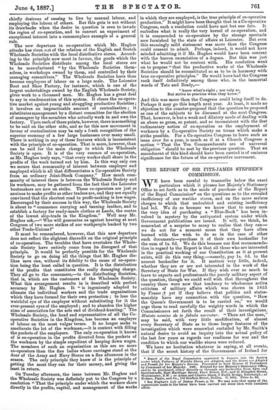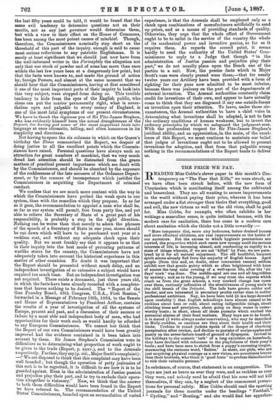THE REPORT OF SIR FITZ-JAMES STEPHEN'S COMMISSION.
WE have been careful to transcribe below the exact particulars which it pleases her Majesty's Stationery Office to set forth as to the mode of purchase of the Report of the Royal Commission* on the questions as to the revealed inefficiency of our warlike stores, and on the more serious charges to which that undoubted and existing inefficiency had led. We do so because we know that to many men the very idea of purchasing a " Blue-Book " has been in- volved in mystery by the antiquated system under which Government publications are issued. It will, we think, be somewhat of a surprise to many to realise that they can— we do not for a moment mean that they have often burned with the wish to do so in the case of other such documents—purchase it of their own bookseller for the sum of Is. 6d. We do this because our first recommenda- tion in regard to the Report is that all those who are interested in the practical working of our Constitution as it at present exists, will do this very thing,—namely, pay is. 6d. to the nearest bookseller for it. It matters very little, indeed, whether they are or are not interested in the work of the Secretary of State for War. If they wish ever so much to leave to experts and professionals the purely military aspect of the question, though we could well wish that throughout the country there were now that tendency to wholesome active criticism of military affairs which was shown in 1855 by Fraser ;t yet if they believe that politica and states- manship have any connection with the question, " How the Queen's Government is to be carried on," we would urge them to read carefully the weighty words in which the Commissioners set forth the result of their investigations. Mutato nomine de to _tabula narrator'. " Thou art the man," may be said, with very little modification, of almost every Secretary of State as to those larger features of the investigation which were somewhat curtailed by Mr. Smith's natural desire to avoid an inquiry into the actual policy of the last few years as regards our readiness for war and the condition to which our warlike stores were reduced.
We have no hesitation whatever in saying, at all events, that if the secret history of the Government of Ireland for
• Report of tha Royal Commission appointed to inquire into the System under „hick Patterns of Warlike Store, are Adopted, and the Stores are Adopted and Passed for her Majesty's Bernina Presented to both Houses of Parliament by Command of her Majesty. 1867. Printed for her Majesty'. Stationery Mee, and to be purchseed, either directly or through any bookseller, from Byre and Spottimmede. East Hardinge Street, Fleet Street. B.O., and 32 Abingdon Street, Westminster, 8.W.; or Adam and Clarion Black, 6 North Bridge. Edinburgh ; or Hodges, Figgie, and Co., 104 Grafton Street, Dublin. C. 5062. Price Is. 6d.
t See Hughees Life of Bishop Prase,. p. 69. We may note that many of the suggeations made in the letter have been carried oat since then with excellent effect. the last fifty years could be told, it would be found that the same evil tendency to determine questions not on their merits, not as any just governor would determine them, but with a view to their effect on the House of Commons, has been among the moat potent causes of mischief. Though, therefore, the Commissioners nominally stop short on the threshold of this part of the inquiry, enough is said to cause most serious reflections to any patriotic Englishman. It is surely at least significant that we should just now have from the well-informed writer in the Fortnightly the allegation not only that our stock of powder and of arms has more than once within the last few years been at a dangerously low point, but that the facts were known to, and made the ground of action by, foreign Powers, and almost at the same moment that we should hear that the Commissioners, having at first considered it one of the most important parts of their inquiry to look into this very subject, were stopped from doing so. This terrible tendency to hide from the eyes of the English public, who alone can put the matter permanently right, what is never- theless open and palpable to every enemy of England, is one of the most fatal symptoms of our present circumstances. We have to thank the vigorous pen of Sir Fitz-James Stephen who has evidently himself been the actual draughtsman of the: Report, for having put some of the most important facts into
language at once idiomatic, telling, and often humorous in its simplicity and directness.
Not having to spare the six columns in which on the Queen's birthday the Times summarised the Report, we despair of doing justice to all the excellent points which the Commis- sioners have raised. Personal questions have always such an attraction for great numbers of mankind, that we very much dread lest attention should be distracted from the grave matters of practical present importance which are dealt with by the Commissioners, and should be absorbed by the exposure of the recklessness of the late accusers of the Ordnance Depart- ment, or by the censure of incompetence which justifies the Commissioners in acquitting the Department of criminal conduct.
We confess that we are much more content with the way in which the Commissioners have probed the weak spots in our system, than with the remedies which they propose. In so far as it goes, the recommendation to appoint a man who shall be, so far as our system will permit, free from party ties, and yet able to relieve the Secretary of State of a great part of his responsibility, is probably a step in the right direction. Nothing can be worse than that merely to adorn the phrases of the speech of a Secretary of State in one year, stores should be cut down which will have to be purchased next year at a reckless cost, and without any adequate check upon their quality. But we must frankly say that it appears to us that in their inquiry into the best mode of procuring patterns of warlike stores for the country, the Commissioners have not adequately taken into account the historical experience in this matter of other countries. No doubt it was important that the Report should be presented without much delay, and an independent investigation of so extensive a subject would have required too much time. But an independent investigation was not required. There exists a document, just three years old, in which the facts have been already recorded with a complete- ness that leaves nothing to be desired. The "Report of the Gun Foundry Board, 48th Congress, U.S.A., First Session," forwarded in a Message of February 18th, 1884, to the Senate and House of Representatives by President Arthur, contains the results of a year of investigation of all the systems of Europe, present and past, and a discussion of their success or failure by a most able and independent body of men, who had opportunities for their work such as would hardly be afforded to any European Commissioners. We cannot but think that the Report of our own Commissioners would have been greatly improved had the evidence contained in it been taken into account by them. Sir James Stephen's Commission were in difficulties as to determining what proportion of work ought to be given to the trade (Report, p. xxxv.), and to the Arsenals respectively. Further,they say (p. ciii., Major Scott's complaint): —"We are disposed to think that this complaint may have been well founded ; but though the operation of petty jealousies of this sort is to be regretted, it is difficult to see how it is to be guarded against. Even in the administration of Justice passion and prejudice play their part, and to try to exclude their opera- tion altogether is visionary." Now, we think that the answer to both these difficulties would have been found in the Report
we have referred to. The recommendation of the United . .
experience, is that the Arsenals shall be employed only as a check upon combinations of manufacturers artificially to send up prices, and as a means of providing standards of quality. Otherwise, they urge that the whole effort of Government ought to be to enlist in the service of the country the whole of its mechanical power and inventive genius, so far as it requires them. As regards the second point, it seems hardly to need the authority of the United States' Com- missioners to reply to a Judge that though " in the administration of Justice passion and prejudice play their part," we do not usually place upon the Bench one of the parties to a suit. Now, the precise facts which in Major Scott's case were clearly proved were these,—that for nearly twelve years our Artillery have been provided with a form of sighting for their guns now admitted to be most inferior, because there was jealousy on the part of the departments of external invention. The Arsenal authorities constantly claim credit for inventions of their own, and appear to have actually come to think that they are disgraced if any one outside forces an invention upon their attention. To leave, under those cir- cumstances, the Arsenal authorities to have a chief voice in determining what inventions shall be adopted, is not to face the ordinary conditions of human weakness, but to invert the ordinary principles by which we safeguard the judgment-seat. With the profoundest respect for Sir Fits-James Stephen's juridical ability, and an appreciation, in the main, of the excel- lence of this Report, we must continue to maintain our belief that judges of inventions ought not to be allowed to present inventions for adoption, and that from that palpable wrong nothing in the recommendations of the Report tends to deliver us.



































 Previous page
Previous page